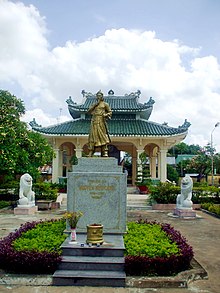Biên Hòa
You can help expand this article with text translated from the corresponding article in Vietnamese. (March 2024) Click [show] for important translation instructions.
|
Biên Hòa | |
|---|---|
| Biên Hòa City Thành phố Biên Hòa | |
From left to right, from top to bottom: Trấn Biên Temple of Literature, Buddha Mau Buu Hoa shrine, Ghềnh bridge | |
 | |
| Coordinates: 10°57′N 106°49′E / 10.950°N 106.817°E | |
| Country | |
| Province | Đồng Nai |
| Region | Southeast |
| Area | |
• Total | 263.62 km2 (101.78 sq mi) |
| Population (2024) | |
• Total | 1,575,000 |
| • Density | 6,000/km2 (15,000/sq mi) |
| Metro GDP (PPP, constant 2015 values) | |
| • Year | 2023 |
| • Total | $19.8 billion[1] |
| • Per capita | $17,800 |
| Climate | Aw |
Biên Hòa (Northern accent: ⓘ, Southern accent: ⓘ) is the capital city of Đồng Nai Province, Vietnam, and is part of the Ho Chi Minh City metropolitan area. Situated northeast of Ho Chi Minh City (also known as Saigon), Biên Hòa is connected to it via National Route 1. As a class-1 provincial city, it is the sixth largest city in Vietnam by population.[2]
Geography
[edit]Topography
[edit]Biên Hòa spans 264 square kilometers of midland terrain in western Đồng Nai Province. The majority of the city is situated to the east of the Đồng Nai River.
Biên Hòa shares its borders with:[3]
- Trảng Bom district to the east
- Bình Dương Province to the west
- Long Thành district and Ho Chi Minh City to the south
- Vĩnh Cửu district to the North
Administrative divisions
[edit]Biên Hòa has 30 divisions (29 wards and 1 commune), including:[4]
Demographics
[edit]In 1989, Biên Hòa's population was estimated at 273,879. By 1999, it had grown to 435,400 and reached 701,194 in 2009.[5] In December 2012, the city's population surpassed one million.[6] By 2019, it had increased to 1,055,414.[7]
As of 2021, the city's population was 1,119,190.[8]
History
[edit]

Nguyễn dynasty
[edit]
The capture of Biên Hòa on 16 December 1861, was an important allied victory in the Cochinchina Campaign (1858–62). This campaign, fought between the French and the Spanish on the one side and the Vietnamese (under the Nguyễn dynasty) on the other, began as a limited punitive expedition and ended as a French war of conquest. The war concluded with the establishment of the French colony of Cochinchina, a development that inaugurated nearly a century of French colonial dominance in Vietnam.[citation needed]
Republic of Vietnam
[edit]Biên Hòa grew into a major suburb of Saigon as the capital city of the Republic of (South) Vietnam grew. Following the First Indochina War, tens of thousands of refugees from the northern and central regions of Vietnam—a large portion of whom were Roman Catholics—resettled in Biên Hòa as part of Operation Passage to Freedom. During the Vietnam War, the United States Air Force operated Biên Hòa Air Base near the city. Mortar attacks on U.S. and ARVN targets were frequently staged from residential districts in Biên Hòa. Two of the better-known attacks took place during Tết of 1968 as well as 1969.[9]
Socialist Republic
[edit]Because of its large population of former refugees and their descendants who fled North Vietnam's communist government in the mid-1950s, Biên Hòa was a center of resistance against the communist government in the months immediately following the fall of the Republic of Vietnam.[citation needed]
Like much of Vietnam, post-war Biên Hòa suffered a period of severe economic decline between 1975 and the second half of the 1980s. However, after the government of the Socialist Republic of Vietnam introduced Đổi Mới, a series of economic and political reforms in 1986, Biên Hòa experienced significant economic growth. The city and its surrounding areas attracted substantial foreign investment, leading to industrialization and development.[10]
By 2005, Biên Hòa had become an industrial hub of southern Vietnam. Many factories and warehouses (often funded in collaboration with Japanese, Singaporean, American, Swiss and other foreign investors) operate in the areas surrounding the city.
With regard to entertainment, the city includes several amusement parks, nightclubs and restaurants lining the Đồng Nai River. Construction has increased rapidly, with many Western-style houses and villas under development. The real estate market has experienced a series of boom cycles since the mid-1990s.[11]
Biên Hòa is home to Bình An Cemetery (also known as Biên Hòa Military Cemetery), a large national cemetery for fallen soldiers and military officials of the former Republic of Vietnam (ARVN). After the fall of Saigon, the cemetery was ransacked and subsequently abandoned.[12] The Vietnamese American Foundation, also known as The Returning Casualty, is working to restore the cemetery and excavate a nearby mass grave of approximately 200 ARVN soldiers.[13]
At the end of 2015, the Prime Minister of Vietnam issued Decision No.2488/QD-TTg recognizing Biên Hòa as a class-1 provincial city.[14]
Economy
[edit]Biên Hòa is a key industrial hub in southern Vietnam. There are six industrial zones:
- Biên Hòa I Industrial Park. The country’s oldest industrial park, covering 340 hectares, is set to be converted into an urban, commercial, and service area by the end of 2025.[15][16]
- Biên Hòa II Industrial Zone, 365 ha
- Amata Industrial Park, 674 ha. This is the first investment project of Amata Corporation in Vietnam.[17]
- Long Bình Industrial Zone Development
- Agtex Long Bình Industrial Park - AGTEX 28, 43 ha
- Tam Phước Industrial Park, 323 ha
Sanyang Motor's Vietnam Manufacturing & Export Processing Co., Ltd. (VMEP) is located in Biên Hòa.
Transport
[edit]- National Route 1, National Route 51, and National Route 1K pass through the city.
- Hồ Chí Minh Bridge leads out of the south of the city.
- Biên Hòa station on the North–South Railway also leads out of the city.
- Bien Hoa Air Base is one of the biggest air bases in Vietnam.
- Đồng Nai port is located on Đồng Nai river.
Education
[edit]- Dong Nai University
- Lạc Hồng University
- Lương Thế Vinh High School for the Gifted
- Ngo Quyen High School
Environment
[edit]Biên Hòa Air Base served as the main storage and handling site for Agent Orange during the Vietnam War and remains the largest dioxin hotspot in Vietnam.[18] U.S. and Vietnamese authorities are working to clean up the affected areas.[18][19]
Notable landmarks
[edit]- Trấn Biên Literature Temple has been recognised as national historical relic.[20] Ancient Citadel of Biên Hòa is the only ancient citadel in the Southern Vietnam that still exists today.[21] Nguyễn Hữu Cảnh Temple worships Nguyễn Hữu Cảnh, the General had a huge contribution in the Nam tiến.
- Sonadezi Building - the first skyscraper in Biên Hòa city and Đồng Nai province
- The Mira Central Park Hotel - the highest hotel building in Biên Hòa
- The Pegasus Plaza - the highest twin building in Biên Hòa
- Universe Complex: Dynamic - the current highest building in Biên Hòa
- Đồng Nai Bridge
- Hóa An Bridge
- Ghềnh Bridge (1901-1904) - designed by company associated with Gustave Eiffel; 2 spans was collapsed in 2016 and new bridge was built months later in the same year
- Rạch Cát Bridge (1903) - outer spans designed by company associated with Gustave Eiffel; inner span added during Vietnam War[22]
Sister city
[edit]References
[edit]- ^ "TelluBase—Viet Nam Fact Sheet" (PDF). Tellusant Public Service Series. Retrieved 31 July 2024.
- ^ "Biên Hòa chính thức trở thành đô thị loại I". Báo Đồng Nai điện tử.
- ^ "Atlas Đồng Nai". Đồng Nai Province official website.
- ^ "Sơ đồ tổ chức". UBND Thành phố Biên Hòa.
- ^ Population module gso.gov.vn [dead link]
- ^ Chào mừng Hội nghị hiệp hội các đô thị Việt Nam diễn ra tại thành phố Biên Hòa — Trang thông tin điện tử thành phố Biên Hòa Archived 26 November 2013 at the Wayback Machine
- ^ "Kết quả toàn bộ tổng điều tra dân số và nhà ở năm 2019" (PDF). Tổng cục Thống kê Việt Nam. p. 34.
- ^ "Phát triển thành phố Biên Hòa, tỉnh Đồng Nai theo hướng hiện đại – xanh – thông minh". Báo Bộ Xây Dựng. 9 September 2022.
- ^ Pike, Thomas F., Operations & Intelligence, III Corps Reporting: Tet 1969, 2016, ISBN 978-1-534-79903-5, pp 91-103.
- ^ "Kỷ niệm 320 năm hình thành và phát triển Biên Hòa - Ðồng Nai". Nhân Dân Newspaper. 28 December 2018.
- ^ "Bất động sản Biên Hoà bùng nổ trong năm 2018". Tuổi Trẻ Newspaper. 16 March 2018.
- ^ "Excavations of Burial Sites at Vietnamese Re-Education Camps by The Returning Casualty". Southeast Asian Archaeology. 1 March 2012. Retrieved 11 October 2024.
- ^ Excavations of Burial Sites at Vietnamese Re-Education Camps by The Returning Casualty, Julie Martin, MSc in Forensic Archaeology and Anthropology candidate, Cranfield University UK, from south-eastasianarchaeology.com
- ^ "Quyết định 2488/QĐ-TTg năm 2015 về việc công nhận thành phố Biên Hòa là đô thị loại I trực thuộc tỉnh Đồng Nai do Thủ tướng Chính phủ ban hành". Thư viện Pháp luật. 21 November 2020.
- ^ "A glimpse into Vietnam's oldest industrial park before it's gone". VnExpress. Retrieved 10 October 2024.
- ^ "Vietnam's oldest industrial park to be converted into urban area". Tuoi Tre News. Retrieved 10 October 2024.
- ^ "Amata to build two more industrial-urban complexes in Vietnam". Vietnamnet.
- ^ a b "Dioxin Remediation at Bien Hoa Air Base Area Project | Vietnam". U.S. Agency for International Development. 11 January 2024. Archived from the original on 6 April 2023. Retrieved 10 October 2024.
- ^ "Vietnam, US finish first part of dioxin cleanup at Bien Hoa airbase". VNExpress.
- ^ "Trấn Biên Temple recognised". Việt Nam News. Retrieved 24 August 2016.
- ^ "Work starts on restoration of ancient citadel in Dong Nai". Việt Nam National Administration of Tourism. Retrieved 4 December 2014.
- ^ "Cầu Rạch Cát (Rach Cat Bridge)". HistoricBridges.org. 29 November 2018. Retrieved 20 December 2022.
- ^ "자매도시". gimhae.go.kr (in Korean). Gimhae. Retrieved 15 April 2020.
- ^ "TP.Biên Hòa và TP.Pakse tăng cường hợp tác hữu nghị (English: Bien Hoa and Pakse strengthen friendship cooperation)". Đồng Nai Newspaper. Retrieved 16 August 2022.
10°57′N 106°49′E / 10.950°N 106.817°E


 French
French Deutsch
Deutsch









